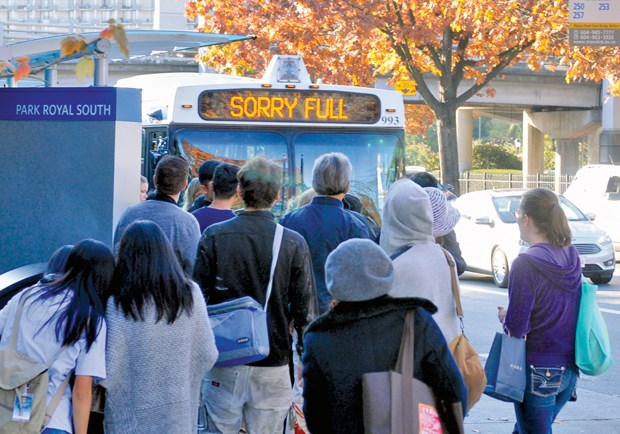The Lower Mainland’s mayors and the province have broken the deadlock that will open up millions of dollars in funding for local transit improvements.
The Mayors’ Council on Regional Transportation voted Friday to go public with Phase 1 of their vision for transit improvements as well as a new basket of funds to pay for them.
On the North Shore, that will mean another new SeaBus with eventual 10-minute rush-hour service and 15-minute service in off-peak hours; more frequent buses on the 229, 240, 250, 254, 255, 256 and 257 routes as well as a new B-line bus running the length of Marine Drive and Third Street, and big upgrades to Phibbs Exchange and the Lonsdale Quay terminal.
The federal and provincial governments have already committed to funding $370 million and $246 million of Phase 1 of the mayors’ plan respectively. The rest will now be coming from the sale of surplus TransLink properties, an increase in property taxes that amounts to about $3 more per year for the average Lower Mainland home, a five- to 10-cent increase in fares and, starting in 2020 and 2021, a new fee on new development and some form of mobility pricing.
The local improvements are all “desperately needed,” said City of North Vancouver Mayor Darrell Mussatto.
“It’s’ been a long, long seven years here with no significant improvements to public transportation,” he said. “Hopefully the first thing you notice is the more frequent SeaBus. ... You’re going to see a new ship being commissioned, which is great and hopefully you’ll see more buses on the North Shore relatively soon.”
West Vancouver Mayor Mike Smith, who previously voted against the mayors’ council vision, said the more frequent service should woo more of his residents onto the transit system.
“The bottom line is the traffic is getting worse and worse and worse and people are realizing … we’re not going to get a new bridge. People really have the option for sitting in traffic for longer and longer periods or taking transit,” he said, noting his friends are increasingly choosing to bus downtown.
District of North Vancouver Mayor Richard Walton said he is most excited to see more frequent SeaBus service and terminal improvements, especially in the evenings when service drops to every 30 minutes.
“That’s one everyone on the North Shore from West Van to Deep Cove will probably appreciate,” he said, noting the terminal is a “bleak place to wait.”
“If you look around at the surroundings, they’re cold, they’re unfriendly, and they’ve got 40-year-old heaters. It’s just not a nice place to wait around, especially at night,” he said.
But all three expressed deep reservations about dipping into property tax to help fund the transit machine.
Because of West Vancouver’s multi-million-dollar homes and assessments, the $3-per-household increase in property taxes was “absolute nonsense,” Smith said.
Mussatto agreed.
“The use of property taxes is really unfair to most people on the North Shore because our values of houses are significantly higher than most other places,” he said. “We pay a disproportionate amount of tax that way.”
Both Smith and Mussatto said they’d like to see transit paid for through vehicle levies. Mussatto said the Carbon Tax would be a “perfect fit” and road pricing could be put in place sooner, if there was the political will, but the province has stymied efforts to open up any new avenues of funding, Mussatto said.
While there are preferred options, Walton said, the mayors' council felt it was time to be pragmatic and get some results. “At this point, we think it’s an investment in public transportation that’s justifiable,” he said.
The mayors’ council also passed a motion from Smith calling on the province to return local control over funding TransLink to the mayors.
“We don’t tell the province where to get their money. They shouldn’t be telling us where to get ours,” he said.
Premier Christy Clark, in a statement, praised the mayors for coming up with their share of the cash.
“Expanding transit in Metro Vancouver has never been more important. These investments will help meet rising demand, ease congestion, lower our carbon footprint and further enhance quality of life in what is already one of the world’s most livable cities,” she said.
TransLink will consult with the public on the changes over the month of October before holding a final vote on the matter in November.



